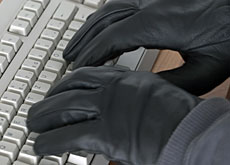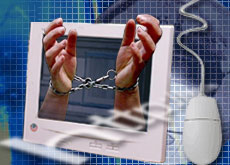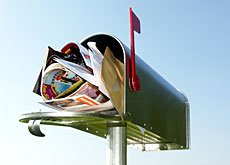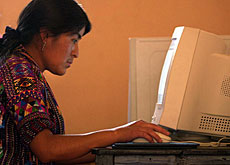Vulnerability of computer networks highlighted

A recent cyber attack on computer networks in Estonia has underlined the risks facing hi-tech countries such as Switzerland.
A first meeting of the non-governmental Geneva Security Forum discussed cyber and information security this week. Switzerland says it is aware of the risks but its means are limited.
The onslaught on Estonia’s public and private computer infrastructure last month – allegedly carried out by Russia over the removal of a Soviet war monument – crashed websites. To remain open to local users, Estonia had to cut access to its sites from abroad.
Some experts have described the attack as the first cyber war. Mikko Hyppönen, a computer security expert from Finland, says most defence ministries are examining ways of protecting against such attacks.
The United States Department of Defense claims some countries, including China, have units within the armed forces which are planning cyber attacks.
“It is a very important issue and not enough attention has been given to it,” said George Joffé, a former member of the London-based Royal Institute of International Affairs, who also took part in the Geneva meeting.
He highlighted the armed conflict between Israel and Lebanon last year which included cyber attacks between militant groups on both sides.
Asymmetric warfare
Alyson Bailes, director of the Stockholm International Peace Research Institute, warned that assaults on computer technology could become a weapon used by poor countries or militia groups.
“It’s a weapon of asymmetric warfare against rich and high-tech countries,” she said.
Hyppönen however does not believe in the spectre of cyber terrorism.
“These groups aim at physical destruction and deaths to create an atmosphere of fear and panic. An attack which blocks computer servers is unlikely to achieve this,” he said.
Hyppönen added that cultural tensions and ideological conflict are ideal territory for cyber attacks, as shown in the controversy last year of caricatures of Muhammad which were printed in a Danish newspaper.
“We are witnessing a race with digital weapons, which can cause enormous economic damage,” said Carlos Moreira, founder and president of WISeKey, a Swiss company specialising in information security, one of the driving forces behind the Geneva Security Forum.
Prevention
The Swiss authorities say it is difficult to protect computer servers of private or public institutions against such attacks.
“It is impossible to prevent such action because it is not possible to distinguish friendly from hostile visits to a site,” said Ruedi Rytz of Melani, the reporting and analysis centre on information security.
“The only thing we can do is increase the number of servers, improve bandwidth and contact the authorities of the country where the attack originated. International cooperation also makes it easier to repair computer systems damaged by the attacks.”
swissinfo, based on a French article by Frédéric Burnand
The first meeting of the Geneva Security Forum took place on June 20-21.
The organisers say the aim is to identify the risks for information security and assess possible political, economic and technical ways of responding to them.
The Forum also seeks to promote companies active in internet security in the Geneva region.
The forum’s director is Daniel Stauffacher, a former ambassador and co-organiser of the World Summit on the Information Society (WSIS).
The government has set up a special unit within the Federal Police Office to coordinate the fight against cyber crime.
In response to a government decision in 2003, the finance ministry, alongside the Federal Police Office and the Swiss Education & Research Network, launched a reporting and analysis centre for information security.
A new law came into force in April banning spam.

In compliance with the JTI standards
More: SWI swissinfo.ch certified by the Journalism Trust Initiative




You can find an overview of ongoing debates with our journalists here. Please join us!
If you want to start a conversation about a topic raised in this article or want to report factual errors, email us at english@swissinfo.ch.